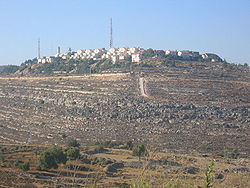This is an old revision of this page, as edited by Carwil (talk | contribs) at 11:20, 28 October 2010 (adding text on legality extensively discussed here). The present address (URL) is a permanent link to this revision, which may differ significantly from the current revision.
Revision as of 11:20, 28 October 2010 by Carwil (talk | contribs) (adding text on legality extensively discussed here)(diff) ← Previous revision | Latest revision (diff) | Newer revision → (diff)| The neutrality of this article's introduction is disputed. Relevant discussion may be found on the talk page. Please do not remove this message until conditions to do so are met. (September 2010) (Learn how and when to remove this message) |
| Psagot | |
|---|---|
 | |
| Country | Israel |
| Council | Mateh Binyamin |
| Region | West Bank |
| Affiliation | Amana |
| Founded | 1981 |
| Founded by | Beit VeGan residents |
| Population | 1,623 |
Psagot (Template:Lang-he-n, lit. Peaks) is a communal Israeli settlement in the West Bank. Located on the Jabel Tawil/Mount Tawil hill near Ramallah, it falls under the jurisdiction of Mateh Binyamin Regional Council. The offices of the regional council are located in Psagot. In 2008 it had a population of 1,623.
Israeli settlements in the West Bank are considered illegal by the international community, but the Israeli government disputes this.
Geography
Psagot is located on the peak of Mount Tawil, hence its name. It can be accessed from Highway 60 from the north and south.
History
Prior to 1967, Jabel Tawil hill was a green space used by local residents and distant visitors as a recreational site. Due to frequent visitors from the Persian Gulf, it was known to locals as the Kuwaiti hill. In 1964, part of the site was purchased by the municipality of Al Quds (Jerusalem) to build a tourist resort. Following the 1967 War, it came under Israeli military control. In September 1976, "Arabs were prohibited from building" in the area.
Psagot was established in 1981 by a gar'in of residents of the Jerusalem neighborhood of Beit VeGan with the support of the Likud party. Psagot is considered illegal under international law, though Israel disputes this.
Economy
The Psagot winery was founded by Na’ama and Yaakov Berg, who planted vineyards in 1998. In addition to a modern barrel cellar, some of the oak barriques are stored in a cave dating back to the Second Temple. The winery’s top wine is a Bordeaux blend named Edom. Regular varietal wines are produced in the Psagot series and there is also a Port-style wine. In 2007 and 2008, the winery produced 65,000 bottles annually. Other wineries exist around Psagot, and the Yesha Council hopes to make them a tourist attraction. According to the local Palestinians and the Israeli human rights group Yesh Din, the wineries are partially planted on a privately owned Palestinian land.
References
- ^ HaReuveni, Immanuel (1999). Lexicon of the Land of Israel. Miskal – Yedioth Ahronoth Books. p. 795. ISBN 965-448-413-7.
- "Locality File" (XLS). Israel Central Bureau of Statistics. 2008. Retrieved 22 June 2010.
- "The Geneva Convention". BBC.
- ^ Hilal, Sandi (Spring 2009). "The Future Archaeology of Israel's Colonisation". Afterall Journal (20).
{{cite journal}}: Unknown parameter|coauthors=ignored (|author=suggested) (help) - Arab Women's Information Committee (1 January 1977). The Arabs Under Israeli Occupation, 1980. Inst for Palestine Studies. p. 67.
{{cite book}}: Unknown parameter|coauthors=ignored (|author=suggested) (help) - ^ Settler vineyards take root in West Bank BBC. 17 June 2009
- Whitacker, Brian. The summit of Middle East tension The Guardian. 3 September 2001
- Psagot Winery at Rogov's Reviews
Categories: